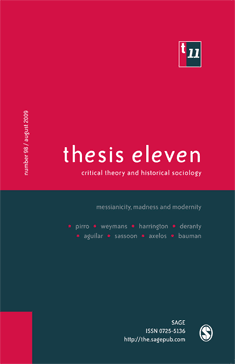
Thesis Eleven
Scope & Guideline
Advancing critical thought in the humanities and social sciences.
Introduction
Aims and Scopes
- Interdisciplinary Critical Theory:
The journal focuses on critical theory as a method for understanding and interpreting social phenomena, drawing from various traditions, including Marxism, poststructuralism, and psychoanalysis. - Cultural Sociology:
An emphasis on cultural sociology allows for the examination of how culture influences social structures and individual experiences, often exploring the intersections of culture, politics, and identity. - Historical and Comparative Analysis:
The journal frequently employs historical and comparative methodologies to analyze social transformations, drawing connections between different social contexts and historical epochs. - Normative and Ethical Considerations:
Thesis Eleven addresses normative questions related to ethics, democracy, and social justice, often critiquing contemporary societal norms and proposing alternative frameworks. - Focus on Contemporary Issues:
The journal engages with pressing contemporary issues, such as populism, environmental crises, and the impacts of globalization, providing critical insights and theoretical reflections.
Trending and Emerging
- Posthumanism and New Materialism:
Recent publications reflect a growing interest in posthumanist perspectives and new materialism, exploring how these frameworks challenge traditional human-centered theories and address issues of agency and matter. - Ecological and Environmental Critique:
There is an increasing focus on ecological issues, particularly the intersections of capitalism and environmental crises, emphasizing the need for critical analyses of sustainability and ecological politics. - Populism and Political Identity:
Emerging themes around populism, identity politics, and social movements indicate a heightened engagement with contemporary political dynamics, reflecting the urgency of these issues in the current socio-political climate. - Affect and Emotion in Social Theory:
The exploration of affect and emotional processes within social theory is gaining traction, highlighting the importance of emotions in shaping social interactions and collective identities. - Digital Culture and Social Media:
The journal is increasingly addressing the implications of digital culture and social media on social theory, examining how these platforms influence identity, community, and political engagement.
Declining or Waning
- Traditional Marxism:
While Marxist theory remains a foundational element of the journal, there has been a noticeable decline in papers that strictly adhere to traditional Marxist frameworks, possibly due to the rise of more pluralistic approaches in critical theory. - Economic Determinism:
The journal has seen fewer articles that emphasize economic determinism as a primary lens for understanding social phenomena, suggesting a shift towards more nuanced interpretations that consider cultural and ideological factors. - Static Historical Narratives:
There appears to be a waning interest in static historical narratives that do not engage with contemporary implications or theoretical advancements, as the journal increasingly favors dynamic and intersectional analyses.
Similar Journals
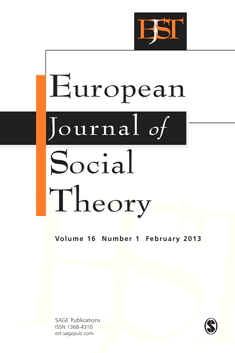
European Journal of Social Theory
Elevating academic rigor in the study of society.The European Journal of Social Theory (ISSN: 1368-4310; E-ISSN: 1461-7137), published by SAGE Publications Ltd, stands as a pivotal resource in the fields of sociology and political science. With a commendable impact factor, recognized within the top quartile (Q1) of its category as per the 2023 rankings, this journal plays a crucial role in shaping contemporary social theory discourse. Covering a broad spectrum of theoretical frameworks and empirical research, the journal aims to facilitate critical engagements with the complex social dynamics characterizing Europe and beyond. Its alignment with high standards of academic rigor is demonstrated through a strong Scopus ranking (Rank #210/1466, 85th percentile), making it an essential read for researchers, professionals, and students alike. As it converges on its mission from 1998 to 2024, the European Journal of Social Theory continues to inspire innovative thought and robust debate within the social sciences.

BERLINER JOURNAL FUR SOZIOLOGIE
Uncovering the dynamics of society with every publication.The BERLINER JOURNAL FUR SOZIOLOGIE, published by VS VERLAG SOZIALWISSENSCHAFTEN-GWV FACHVERLAGE GMBH, stands as a significant contribution to the fields of Sociology and Political Science, with a commendable Scopus rank of 575 out of 1466, placing it within the top 60th percentile of journals in its category. Established in Germany, this journal has been a vital platform for scholarly discourse since its inception in 1992, transitioning through various publishing phases and demonstrating a robust commitment to advancing sociological inquiry. The journal's impact is underscored by its current Q3 quartile classification, reflecting its relevance and authority within the academic community. Although not open access, the BERLINER JOURNAL FUR SOZIOLOGIE ensures that readers and researchers can access a wealth of innovative research that informs social theories and practices, making it an essential resource for those engaged in understanding complex social dynamics. The journal continues to welcome submissions that push the boundaries of sociological thought and promote interdisciplinary approaches to contemporary issues.

Annual Review of Sociology
Showcasing Premier Research in Social SciencesAnnual Review of Sociology, published by Annual Reviews, is a premier academic journal that plays a critical role in advancing the field of sociology. Established as a leading publication since its inception in 1975, the journal brings together the highest quality scholarly reviews, summarizing key developments and trends within the discipline. With a notable Q1 ranking in both Sociology and Political Science and a remarkable 99th percentile Scopus rank among over 1400 journals, it consistently showcases cutting-edge research and invites contributions from preeminent scholars. The journal's rigorous review process ensures that articles provide comprehensive insights and critical analyses, making it an essential resource for researchers, professionals, and students alike. Although it is not an open-access publication, its influential content is crucial for anyone looking to deepen their understanding of social structures, relationships, and dynamics. Located in the heart of Palo Alto, California, the Annual Review of Sociology continues to be a cornerstone in the academic fabric of the social sciences.
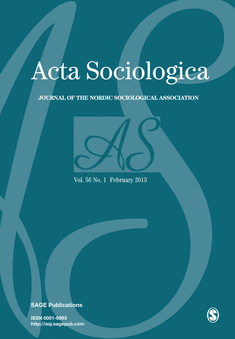
ACTA SOCIOLOGICA
Unveiling Critical Perspectives on Social StructuresACTA SOCIOLOGICA, published by SAGE Publications Ltd, stands as a prominent journal in the fields of sociology and political science, holding a distinguished Q1 category ranking in the 2023 Scopus quartiles. With its inception dating back to 1956, this peer-reviewed journal offers a platform for innovative research, theoretical developments, and critical discussions that shape contemporary sociological discourse. Operating from the United Kingdom, ACTA SOCIOLOGICA reflects the dynamic interplay of social structures, political involvements, and cultural transformations, engaging scholars, practitioners, and students alike in a global context. Because it does not currently offer Open Access, readers benefit from institutional subscriptions to access cutting-edge sociology research, furthering knowledge and enlightenment within the academic community. With an impressive Scopus rank of #291 out of 1466 in the social sciences, the journal continues to influence the scholarly landscape, encouraging rigorous analysis and diverse perspectives essential for understanding the complexities of modern society.

CRITIQUE
Innovative Insights into Cultural Narratives.CRITIQUE is a prominent French academic journal published by EDITIONS MINUIT, specializing in the fields of cultural studies, history, and literary theory. Since its inception, CRITIQUE has provided a critical platform for scholarly discourse, aiming to challenge conventional perspectives and foster innovative thought within the humanities. While it operates under a traditional subscription model, its commitment to intellectual rigor positions it as a valuable resource for researchers, students, and professionals alike. With a focus on interdisciplinary approaches and critical methodologies, CRITIQUE holds its place among the esteemed ranks of cultural studies and literary publications, currently rated in Q4 across various categories by Scopus. As it converges through the years from 2015 to 2024, the journal continues to facilitate discussions that interrogate historical narratives and their cultural contexts, making it an essential read for anyone invested in the developments of contemporary thought in the humanities.

SOCIOLOGISK FORSKNING
Championing Empirical Analysis for Social ProgressSociologisk Forskning is a prestigious open-access journal based in Sweden, focusing on the fields of sociology and political science. Established in 1996, this journal has evolved to be an important platform for disseminating innovative research and critical discourse in the social sciences. Published by the Socilogisk Forskning institution, it aims to foster interdisciplinary dialogue and promote insights that address contemporary social issues. With an impact factor that positions it in the Q3 quartile of its category as per the 2023 rankings, the journal ranks #1045 out of 1466 in the Scopus database, reflecting its relevance and contribution to the academic community. Since adopting an open-access model in 2015, it has enhanced the accessibility of its research outputs, allowing a wider audience of scholars, practitioners, and students to engage with and apply its findings. Subscribers and contributors to Sociologisk Forskning benefit from its robust commitment to critical empirical analysis and theoretical development in the evolving landscape of social science research.

Insan & Toplum-The Journal of Humanity & Society
Bridging gaps in knowledge with open access scholarship.Insan & Toplum - The Journal of Humanity & Society, published by ILEM, is a prominent open access journal dedicated to advancing the fields of social sciences and humanities. Since its inception in 2011, this journal has provided a platform for interdisciplinary research that addresses critical social issues, cultural dynamics, and philosophical inquiries, fostering a rich dialogue among scholars, practitioners, and students worldwide. The journal aims to disseminate high-quality research findings and innovative perspectives that reflect the complexities of human society, facilitating a deeper understanding of contemporary challenges. With its commitment to open access, Insan & Toplum ensures that knowledge is freely available to all, thus promoting wider engagement and discourse in its areas of focus. Featured on various academic databases, this journal is recognized for its scholarly contributions and continues to play an essential role in enriching the dialogue in the humanities and social sciences.
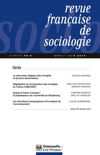
REVUE FRANCAISE DE SOCIOLOGIE
Advancing Sociological Insights Since 1977REVUE FRANCAISE DE SOCIOLOGIE, published by PRESSES SCIENCES PO, is a prominent journal dedicated to the fields of sociology and political science, characterized by its rich historical contributions since its inception in 1977. With a commitment to scholarly excellence, the journal currently holds a Q3 ranking in its category for 2023, illustrating its relevance within the academic community. This esteemed publication offers a platform for innovative research and critical discourse, catering to both established scholars and emerging voices in the social sciences. The journal seeks to explore contemporary sociological issues through rigorous empirical analysis and theoretical reflection, fostering a deeper understanding of socio-political dynamics. Although it does not offer Open Access options, REVUE FRANCAISE DE SOCIOLOGIE remains a vital resource for researchers and students alike, providing access to cutting-edge scholarship that shapes the conversation around societal structures and political frameworks.
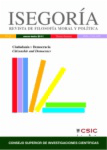
Isegoria
Exploring the Depths of Thought Since 1990Isegoria, published by the Consejo Superior Investigaciones Científicas (CSIC)Philosophy, boasting an impressive commitment to disseminating high-quality research since its inception in 1990. With its ISSN 1130-2097 and E-ISSN 1988-8376, Isegoria has emerged as a significant platform for philosophical discourse, particularly noted for its 2023 inclusion in the Q2 quartile of academic rankings in Philosophy. Currently ranked #359 out of 806 journals in the Arts and Humanities category on Scopus, Isegoria captures an audience that values rigorous academic standards and intellectual exploration. Situated in Madrid, Spain, the journal is accessible globally, contributing to vital dialogues and advancing scholarship across diverse philosophical themes and methodologies. Researchers, professionals, and students alike will find Isegoria to be an essential resource for contemporary philosophical inquiry and debate.
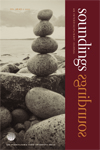
SOUNDINGS
Engaging with Contemporary Issues Through Rigorous InquirySOUNDINGS, published by Penn State University Press, stands as a notable journal within the realms of the arts and humanities, cultural studies, and sociology and political science. With its ISSN 0038-1861 and E-ISSN 2161-6302, this academic periodical has been a platform for critical discourse and innovative research since its inception in the mid-1970s, although it has experienced several convergence periods. Though currently categorized in Q4 within its respective fields, including rankings that reflect its growing influence, SOUNDINGS continues to provide a rigorous space for interdisciplinary dialogue and scholarly reflection. Despite the absence of open access, the journal’s comprehensive articles are vital for researchers, professionals, and students seeking to deepen their understanding of complex cultural and societal dynamics. With its headquarters located at 820 North Univ Drive, U S B 1, Ste C, University Park, PA 16802, SOUNDINGS invites its readership to engage with contemporary issues through a rich lens of academic inquiry.